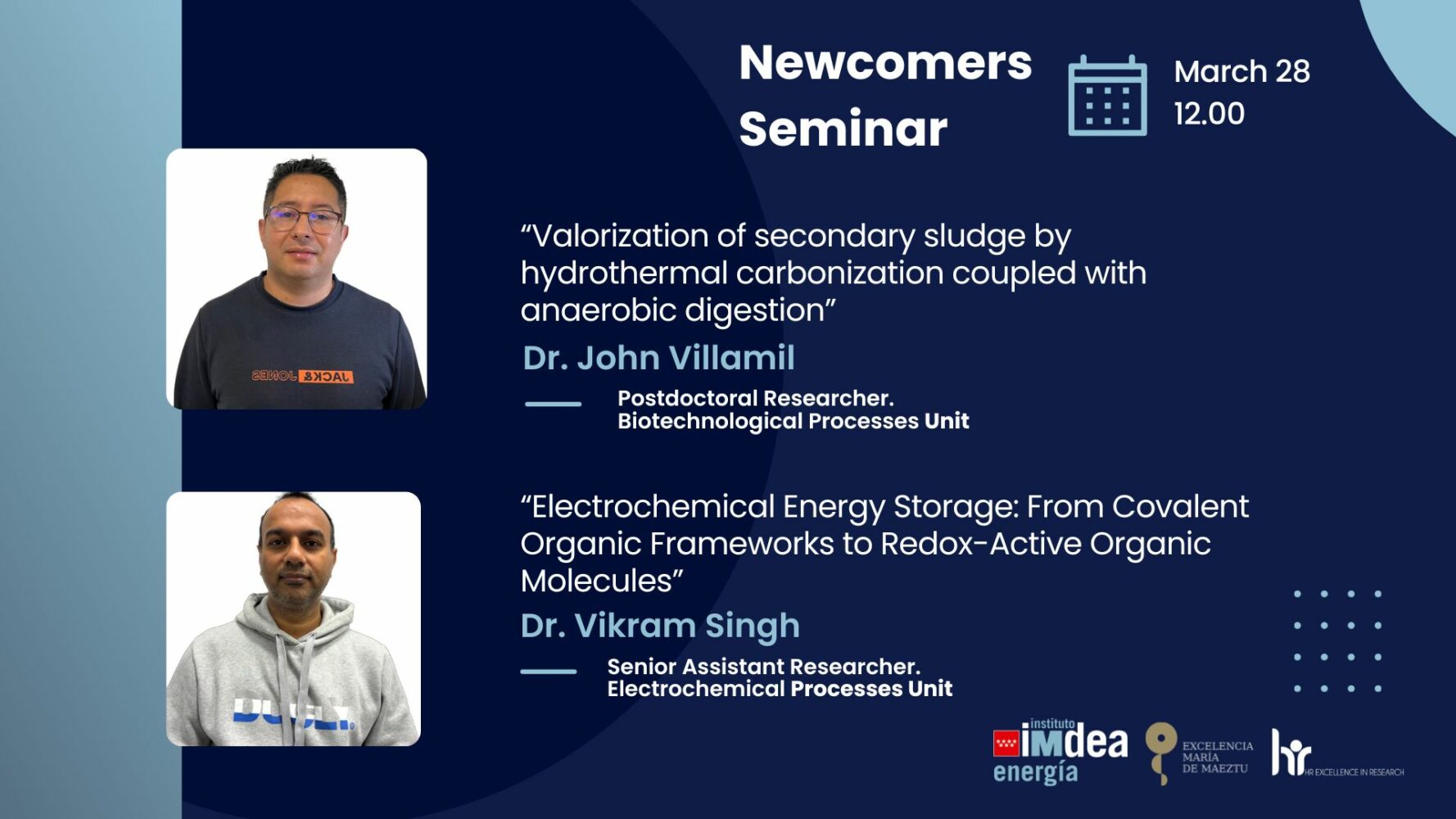Newcomers seminar

Next March 28th at 12 we will hold a new session of the seminar for newcomers in the auditorium.
The first speaker will be Dr. John Villamil from the Biotechnological Processes Unit, with the talk entitled «Valorization of secondary sludge by hydrothermal carbonization coupled with anaerobic digestion».
The second one will be Dr. Vikram Singh, from the Electrochemical Processes Unit, with the talk “Electrochemical Energy Storage: From Covalent Organic Frameworks to Redox-Active Organic Molecules”.
Dr. John Villamil is a postdoctoral researcher at IMDEA Energy, within the Biotechnological Processes Unit, contributing to the Madrid Vuela Sostenible project. This project is dedicated to developing innovative waste recovery technologies for the production of low-carbon aviation fuel. His research centers on enhancing the efficiency and stability of anaerobic digestion through the application of conductive materials, specifically to promote direct interspecies electron transfer and related mechanisms. Additionally, he investigates the impact of microplastics on anaerobic digestion process.
Dr. Villamil earned his PhD from the Autonoma University of Madrid in 2019 with a dissertation titled “Valorization of secondary sludge by hydrothermal carbonization coupled with anaerobic digestion.” Following his doctoral studies, he contributed to the EU project “DEEP PURPLE,” which aimed to transform diluted mixed urban biowastes (wastewater and OFMSW) into sustainable materials, such as bioplastics and biofertilizers, using Purple Phototrophic Bacteria. He also gained experience at the National Renewable Energy Center (Pamplona, Spain), where he conducted research on biological methanation and methanol production within the context of power-to-X technologies. He joined the Biotechnological Processes Unit in May 2024.
Dr. Vikram Singh is a senior assistant researcher in the unit of electrochemical processes at IMDEA Energy Institute, Madrid, Spain. His research focuses on electrochemical energy storage, particularly the development of membrane and membrane-free near-neutral aqueous organic redox-flow batteries (RFBs) and covalent organic frameworks (COFs) as electrode materials metal-organic hybrid batteries. He obtained his PhD in chemical sciences in 2015 from the University of Delhi, India, where he specialized in “copper complex-based monolayers for DNA cleavage”. His postdoctoral research at POSTECH, South Korea (2015–2016), and KAIST, South Korea (2017–2020), explored continuous-flow and standard synthesis of 2D COFs. From 2020 to 2024, he served as a Research Assistant Professor at the Natural Science Research Institute, KAIST, where he developed naphthalene diimide (NDI) derivatives as two-electron anolytes for aqueous RFBs and investigated azo-functionalized COFs for electrochemical energy storage. His research has been published in leading journals, including Advanced Materials (2023), Nature Energy (2024), JACS (2024), and ACS Applied Energy Materials (2023). Alongside his research, he has experience in teaching and mentoring, having delivered courses on supramolecular chemistry, surface chemistry, and nanomaterials. He has also supervised master’s students in their research projects. He is also an inventor on multiple patents, including covalent organic frameworks for solid-state electrolyte applications and functionalized NDI derivatives for aqueous and non-aqueous redox-flow batteries. Throughout his career, he has received several prestigious awards, including the «Caesar Nombela» Talento Grant from the Community of Madrid in 2024, beginning 2025. His expertise in organic electrochemistry, redox-flow batteries, and molecular energy materials continues to contribute to advancements in next-generation energy storage technologies.
Electrochemical Energy Storage: From Covalent Organic Frameworks to Redox-Active Organic Molecules
The pursuit of sustainable energy storage solutions has driven advancements in organic electrode materials for lithium-ion and redox-flow batteries. My research journey has focused on tailoring covalent organic frameworks (COFs) as electrode materials for lithium-ion batteries and developing highly soluble and stable naphthalene diimide (NDI) derivatives as negolytes for aqueous redox-flow batteries.
COFs offer a unique platform for organic battery electrodes due to their ordered mesoporosity, structural robustness, and tunable redox functionalities.1 By integrating azo groups within COF architectures, we achieved two-electron transfer capabilities, with the stability of redox reactions governed by the nature of the linkages.2 Among β-ketoenamine, imine, and thiazole-fused linkages, the latter demonstrated superior electrochemical reversibility and extended cycle life, highlighting the critical role of framework design in enhancing performance.
For redox-flow batteries, we explored NDI derivatives to overcome the solubility and stability challenges of organic redox-active molecules.3-5 By introducing ammonium-functionalized NDI structures, we achieved high solubility (up to 1.5 M) and exceptional cycling stability with 98% capacity retention over 500 cycles. Mechanistic studies revealed the formation and disassembly of NDI clusters during redox cycling, preventing precipitation and enabling long-term operation in neutral aqueous conditions.
This research underscores the potential of organic materials in next-generation energy storage, bridging molecular design with electrochemical performance. By leveraging structural control in COFs and tailored functionalization in NDI-based systems, we demonstrate promising pathways for sustainable and high-performance battery technologies.
El evento está terminado.
Fecha
- Mar 28 2025
- ¡Caducado!
Hora
- 12:00 - 12:00
Localización
- Auditorio IMDEA Energía


